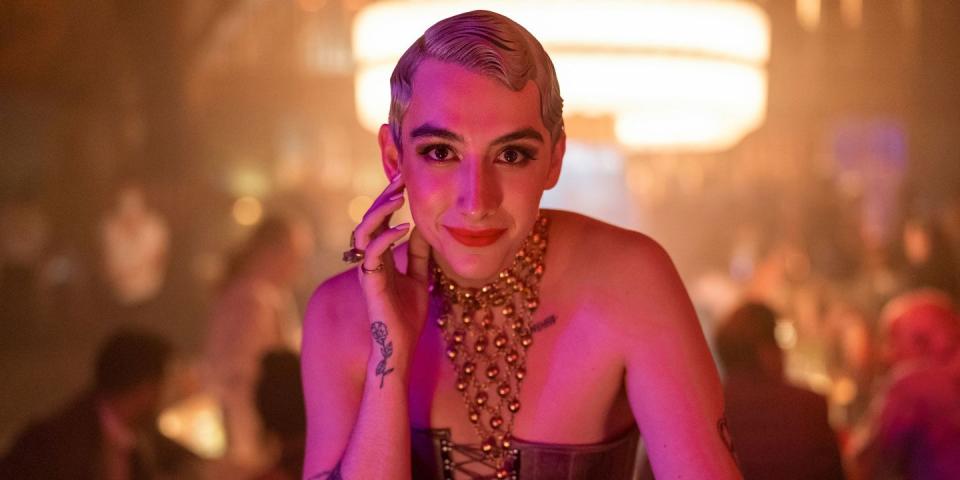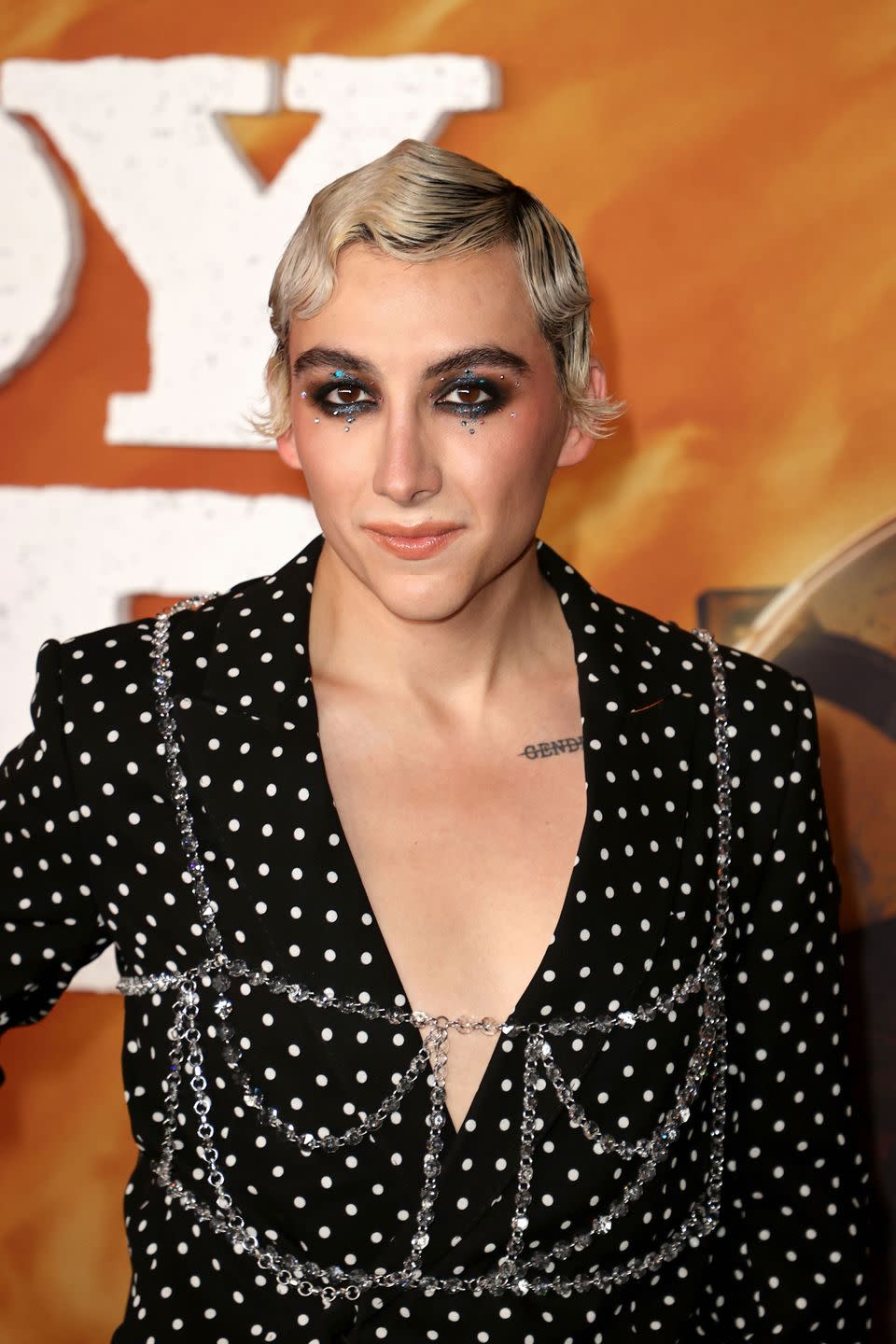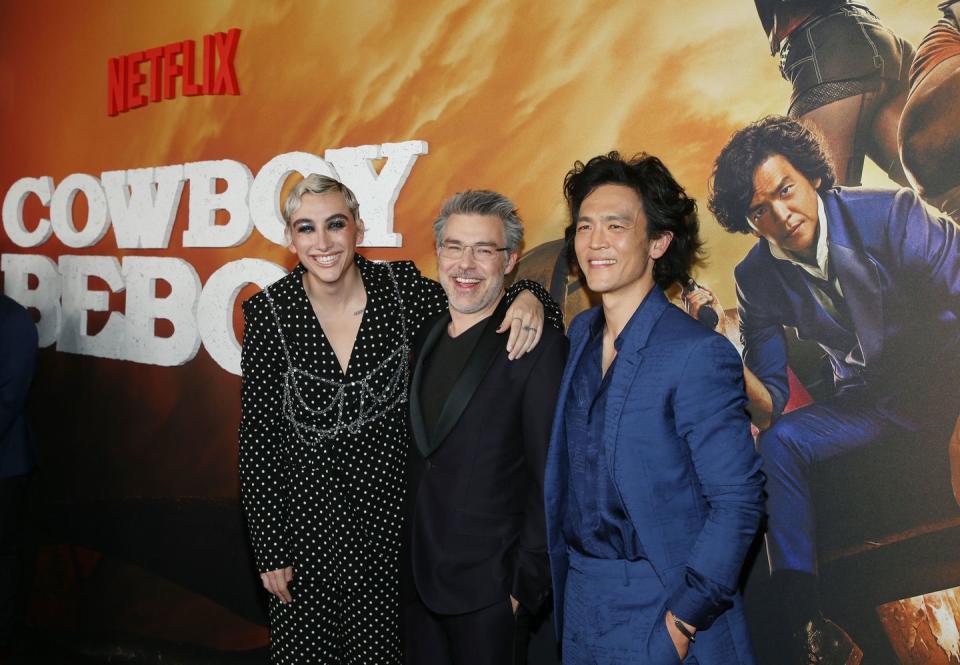'Cowboy Bebop' Star Mason Alexander Says the Show Is Righting the Wrongs of the Anime

Mason Alexander Park has spent their whole career hoping to "exist as a queer person within a sci-fi world," and now they're about to appear in two. Just recently, the non-binary starwas cast as Desire, one of The Endless in Netflix's adaptation of Neil Gaiman's The Sandman. But before that, Mason has just made their debut as Gren in another Netflix adaptation, Cowboy Bebop.
Despite the overall love fans feel for the original Cowboy Bebop anime, Gren has always proved to be a divisive character. On the one hand, it was incredibly progressive to see a '90s character describe themselves as both man and woman, but also "neither". However, certain trans tropes were also intertwined with Gren's arc, making them a pivotal, yet still somewhat problematic icon for queer fans watching back home.
Thankfully, Netflix's new take on Cowboy Bebop has taken this opportunity to overhaul Gren's backstory and portray them fully as a non-binary character who is also played by a non-binary actor.
"It felt really affirming," Mason tells us when we ask about their initial casting. "I think it's rare for people to get it right when it comes to casting queer identities to play and tell a great story. So to have such an iconic, queer-coded role be reclaimed by an openly queer person that hits the gender confusion outside the story [laughs], was really exciting for me."

We caught up with Mason to discuss Gren's reimagining, the "intense" fan response, and why their character wasn't supposed to arrive until season two.
What's the fan response been like following your initial casting announcement?
The fan response is very intense. With anything, it feels like a very mixed bag. People have really polarizing views of things that they love being adapted into any other format, which I completely understand. As a fan of many big franchises, I understand the bond that you create as an audience member with the story, and with the original context as you watch it.
Particularly where there were tonnes of people who were so excited by it, and who had remembered watching the anime when they were younger, hearing the line, "I am both at once, and neither one" that Gren says in the anime. They felt very affirmed and seen – albeit, Gren's situation in the anime, contextually, is obviously rooted in an unfortunate event; it's rooted in trauma. But Gren has found comfort and stability and normalcy in their situation when we meet them, within the show.
So a lot of fans, I think, really understand the nuance of that, and were very excited to see how we were going to take that a step further. And then there's obviously a lot of people – especially people who are not queer, or who are not trans – who don't have a lot of experience with kind of identity, that are arguing the semantics of the thing. They're sort of being like, "Well, Gren is this, and Gren is that. [laughs] Gren can't be non-binary. Gren's not trans."
I understand where that camp might be coming from as well, especially if they don't have a lot of experience first-hand with the nuances of gender. If they're looking at it in a very cut-and-dry way, it's easy to feel like, "Gren's not this, Gren is this." And you really do have to have some kind of experience with dysmorphia or gender confusion and gender playfulness to, I think, understand the original concept of the character and where Gren is now headed.
Given that the character was simultaneously groundbreaking and yet also a bit problematic back in the day, did you feel any apprehension approaching this updated version of Gren?
I was really excited. We were in the midst of the pandemic. I was just very, very excited to have an opportunity to work. But there was fear involved in the recalibration of how we were going to approach the part.
It felt necessary to me. It felt important to me as an artist – as a non-binary person, it felt important to get it right. And to get it right for the representation aspect of it and the storytelling aspect of it, as opposed to just for the optics of, like, "Are people going to think that this is faithful to the original or not?"
I think that André Nemec, our showrunner, and I were more concerned with Gren as an individual, and how Gren's story will affect a new generation of the LGBTQIA+ youth. We wanted to make sure that it was an opportunity to right some of the uncomfortable wrongs of a film like The Crying Game that Gren's entire track is sort of based on. And then, plus, righting some of the issues in the anime.
I'm really proud of what we did. I'm really excited to share that with people. And I’m excited for people to have both versions that exist, because that is the beauty of adaptation. Our version of the show in no way replaces the original, or the original context. It just creates an opportunity to do something a little new and a little fresh.
And so, if anything, it's going to drive more people to the original anime and Gren. And they'll be able to have both of those people – both of those very complicated human beings – exist in the zeitgeist.

How much input did you have in shaping this new, "recalibrated" version of Gren?
Well, you know, I was cast, and the scripts were sort of still in process. They had spent a very long time on the show, then John Cho suffered an injury, and that put everybody on hiatus. And then the pandemic began, and the hiatus was extended indefinitely.
So when Gren came to them in a very dreamlike way, I think they were sort of beginning to map out ideas for season two since they had time off. If there were to be one, they wanted to get ahead and start on those things. And Gren was a major player in their mind, moving forward.
So because of this time off, they thought it might be a good idea to use Gren earlier on in the story. And they began to put me into the season one scripts while they had the ability to.
When I signed onto it, André [Nemec] told me the things he didn't want to do. You know, moments and aspects of the animation that he didn't want to copy. We clung onto some people, like Bowie and style icons that we really wanted to embed in the new design.
I started having meetings with Jane Holland, our costume designer, and we just spoke extensively about shape and silhouettes and designers we love, and what would Gren look like in a new, updated world – because our version of the future takes place a little further out. What influences would Gren bring to it? What aspect of my identity, as an indigenous, Latinx person, would also be embedded in the style?
Is there one look in particular that really encapsulates Gren as a character for you?
The one I'm most proud of is the one that made it into the opening sequence. It is that episode eight look where I'm in a red blouse, with a high neck and a high waist. It's a really fantastic outfit, and it was our homage to the anime. We used the same colors and a similar idea and structure behind the red button-up and the black suit that Gren wears in the bar with Faye in Jupiter Jazz.
We were really excited to show off our version of what that look might be. I had a lot of input in that particular costume. So to see it brought to life and used in this specific scene was really exciting.
SPOILER WARNING: How do you feel about that twist at the end where Julia turns on Spike? It's a huge departure from the anime, but as your character is so intertwined with Julia, how might this impact Gren moving forward?
That is really quite a twist. I think it's a very exciting springboard, to think about storylines that could come from that. I don't think many people – especially people who watch it, or people who were in the room – expected the particular direction that things were going. It was a really fun twist.
Julie and Gren… It's one of the closer relationships I have on the show. Anna and Julia really are Gren's family. And it could be interesting to think about how that will deeply affect their family dynamic moving forward, whether that means Gren has to make any decisions about alliances or whatever that might mean for a relationship with Julia moving forward.
It's a really exciting prospect. The nerd in me is very shocked by it.
Gren and Sandman's Desire are both really iconic, non-binary characters, and you're playing them both on Netflix. But looking back, who in particular inspired you in the same way these characters resonate with queer fans watching back home?
When I was in high-school, I came across a little movie called Hedwig and the Angry Inch. I was going to school for musical theatre, and was sort of hoping to find some kind of purpose moving forward as an actor. I felt like there weren't really many characters that spoke to how I felt internally about my experience as a human being, until I found Hedwig.
And it really, honestly, was the deciding factor for me to go to college, and study theatre. The year that I graduated from school, I began touring the country in the first Broadway National Tour of Hedwig and the Angry Inch. It was with Darren Criss and a bunch of incredible people.
So the role and that show in particular really does mean a lot to me. It is one of those parts that completely aligned with who I am, how I felt about the world, and the questions that I had. And it solidified my understanding of my non-binary identity. There are lyrics and concepts in the show that are just so beautifully poetic, that fully encapsulate my feelings about gender and my experience with it.
That show really… that movie and that musical completely changed the fabric of my life and my being. I'm eternally grateful that it exists as a piece of art, because without it, it might have taken me a lot longer to have the proper terminology or understanding of myself. So, yes, representation really does hold a lot of weight, especially with questioning youth, or people that haven't necessarily been given the opportunity to see themselves.
It can completely restructure your DNA in a rock 'n' roll way.
You Might Also Like

